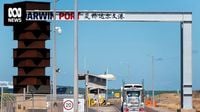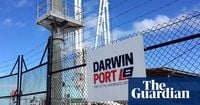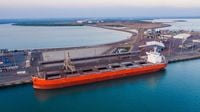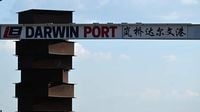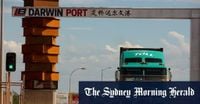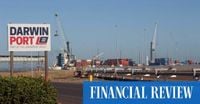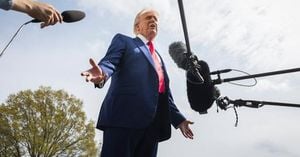In a dramatic turn of events, both major political parties in Australia have made competing promises to reclaim control of the Port of Darwin, currently leased to the Chinese-owned Landbridge Group. This unexpected political maneuvering comes as the nation gears up for the upcoming federal elections, reflecting heightened concerns over national security and foreign ownership of critical infrastructure.
On April 4, 2025, Prime Minister Anthony Albanese announced on ABC Radio Darwin that the government is committed to ensuring the Port of Darwin is returned to Australian hands. "Australia needs to own the Port of Darwin," he declared, underscoring the urgency of the situation. Albanese's announcement came just hours before Opposition Leader Peter Dutton was set to reveal his own plans regarding the port during a flight to Darwin.
Both leaders are reacting to a decade of controversy surrounding the port's lease to Landbridge, which was granted by the Northern Territory government in 2015 for a staggering $506 million over 99 years. This deal, struck by the then Country Liberal Party (CLP) government, has been mired in national security concerns due to Landbridge's connections to the Chinese Communist Party.
In his statement, Albanese emphasized that the government had been seeking a local buyer but was prepared to acquire the lease if necessary. "We prefer that it be through superannuation funds or some other vehicle that doesn’t mean direct taxpayer’s funds, but we’re prepared to go down the road of taxpayer direct involvement as well," he explained.
Meanwhile, Dutton's Coalition has also committed to taking back control of the port. He stated that if a private operator cannot be found within six months, the Coalition government would use its compulsory acquisition powers to reclaim the lease from Landbridge, compensating the company in the process. "In the current geopolitical environment, it is vital that this piece of critical infrastructure, which is directly opposite to the Larrakeyah Defence Precinct, is operated by a trusted, Commonwealth-approved entity," Dutton asserted.
The urgency of these announcements is heightened by recent geopolitical tensions, particularly following the entry of three Chinese warships into Australia’s Exclusive Economic Zone and the docking of a US nuclear submarine in Darwin Harbour. These events have intensified scrutiny over foreign ownership of strategic assets like the Port of Darwin.
Former US President Barack Obama had previously expressed concerns about the lease, indicating that he would have appreciated a heads-up before the deal was finalized. His comments reflect broader worries about the implications of Chinese ownership on Australian and US military operations, particularly given that up to 2,500 US Marines rotate through Darwin each year.
As the political landscape continues to evolve, both Albanese and Dutton have indicated a willingness to use taxpayer funds if a private buyer cannot be secured. Albanese emphasized that Landbridge has not invested adequately in the port, stating, "We don’t think that it is being utilized enough for Darwin. Darwin has an enormous potential to be a growth area of increasing our exports through the port of Darwin, and that is part of the context that we’re dealing with here."
In the face of these developments, Landbridge has maintained that the port is not for sale. Terry O’Connor, the non-executive director for Landbridge in Australia, stated, "Landbridge considers the port a long-term investment that has reported record operational performance this year. We expect this growth to continue in the future."
The political back-and-forth surrounding the Port of Darwin is not just a matter of local interest; it has significant implications for national security and foreign relations. Both parties are racing to solidify their positions ahead of the May 3 election, with promises to prioritize Australian ownership of critical infrastructure.
The lease agreement with Landbridge has long been a point of contention, with both Albanese and Dutton criticizing the decision made by the previous government. Albanese has previously stated, "We opposed the sale of the port of Darwin. We opposed it at the time; we thought that was unwise."
As both parties gear up for the election, the future of the Port of Darwin remains uncertain. The competing promises to reclaim control reflect a growing consensus on the need to address national security concerns, particularly in light of the increasing influence of foreign entities in Australia.
In summary, the Port of Darwin has become a flashpoint in Australian politics, with both major parties pledging to take back control from Landbridge. With the election approaching, voters will be watching closely to see how these promises unfold and what implications they may have for Australia's national security and economic future.
